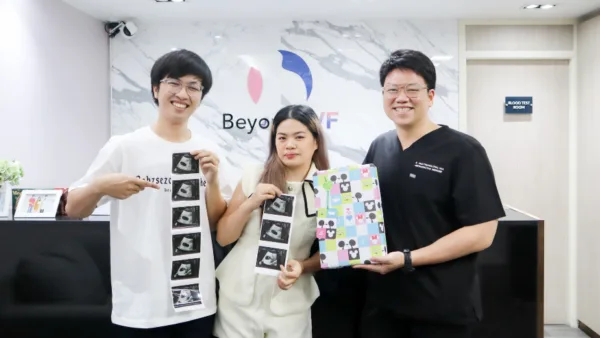Mother Kanitta Had One Son but Struggled to Conceive Her Second Child, Finally Pregnant After Consulting Dr. Ton Phunsak at Beyond IVF
Mother Kanitta had already had one son but struggled to conceive her second child, despite trying for some time. She decided to consult Dr. Ton Phunsak at Beyond IVF and discovered the cause of her infertility!
After trying for a while to conceive, Kanitta noticed that despite her efforts, pregnancy wasn’t happening. She also had irregular periods and began feeling that something was off with her body. She researched infertility, ICSI, and then decided to visit Dr. Phunsak for a full evaluation. During the check-up, it was found that her AMH hormone (which is related to ovarian function) was very low, indicating that her hormones were aging prematurely, leading to early menopause. To make matters worse, she also had two large cysts that were interfering with her ability to conceive. These cysts were likely contributing to both the hormonal decline and her infertility.
Dr. Phunsak advised surgery to remove the cysts, as their size and location were major obstacles to conception. Without the surgery, it would have been impossible for her to get pregnant.
After successfully undergoing the surgery, Kanitta began treatment for infertility again. Dr. Phunsak recommended ICSI (Intracytoplasmic Sperm Injection) as the most suitable option, considering her hormonal levels and physical condition. This treatment method offered the highest success rate and would give her the best chance of conceiving.
Just 15 days after the embryo transfer, her HCG levels skyrocketed, confirming that she was pregnant! Dr. Phunsak then scheduled an ultrasound to confirm the pregnancy and the presence of a gestational sac. The pregnancy was officially confirmed.
Today, Kanitta is still under Dr. Phunsak’s care and is continuing her pregnancy journey
Patient Treated with ICSI (In Vitro Fertilization) with Additional Special Techniques
ICSI (Intracytoplasmic Sperm Injection)
This technique uses a special microscope and a fine needle to inject a single sperm directly into the egg, improving the chances of success, particularly in cases of male infertility or when traditional IVF methods may not be effective.
NGS (Next-Generation Sequencing)
NGS is used to test for chromosomal abnormalities in embryos. By detecting any genetic issues, NGS helps ensure that only the healthiest embryos are selected for implantation, increasing the chances of a successful and healthy pregnancy.
These advanced techniques, along with the expertise of the medical team, provide the best possible outcomes for patients undergoing IVF treatment.


